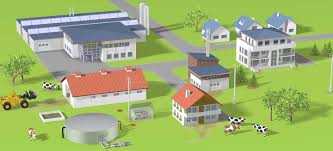An overview of biomass and biogas for energy generation: recent development and perspectives
Keywords:
Biomass resources, Biogas application, Sustainable development, EnvironmentAbstract
Biogas from biomass appears to have potential as an alternative energy source, which is potentially rich in biomass resources. This is an overview of some salient points and perspectives of biogas technology. The current literature is reviewed regarding the ecological, social, cultural and economic impacts of biogas technology. This communication gives an overview of present and future use of biomass as an industrial feedstock for production of fuels, chemicals and other materials. However, to be truly competitive in an open market situation, higher value products are required. Results suggest that biogas technology must be encouraged, promoted, invested, implemented, and demonstrated, but especially in remote rural areas.
References
Abdeen, M.O., 2008. Chapter 10: Development of integrated bioenergy for improvement of quality of life of poor people in developing countries, In: Energy in Europe: Economics, Policy and Strategy- IB, Editors: Flip L. Magnusson and Oscar W. Bengtsson, 2008 NOVA Science Publishers, Inc., 341-373, New York, USA.
Abdeen, M.O., 2012. Applications of biogas: state of the art and future prospective, In: Blue. Biotechnol. J., 1(2), 335-383, NOVA Science Publishers, Inc., New York, USA.
Andrea, S., Fernando, R., 2012. Identifying, developing, and moving sustainable communities through renewable energy, World. J. Sci. Technol. Sustain. Dev., 9(4), 273-281.
Bacaoui, A., Yaacoubi, A., Dahbi, C., Bennouna, J., Mazet, A., 1998. Activated carbon production from Moroccan olive wastes-influence of some factors. Environ. Technol., 19, 1203-1212.
Bessou et al., 2009. Biofuels, greenhouse gases and climate change. Agronomy for Sustainable Development, DOI: 10. 1051/agro/2009039.
Bhutto, A., Bazmi, G., Zahwdi, 2011. Greener energy: issues and challenges for Pakistan – Biomass energy prospective, Renew. Sustain. Energ. Rev., 15(6), 3207-32-19.
Brain, G., Mark, S., 2007. Garbage in, energy out: landfill gas opportunities for the CHP projects. Cogeneration and On-Site Power, 8(5), 37-45.
Cheng et al., 2010. Advanced biofuel technologies: status and barriers. World Bank Report, WPS5411.
Cheng, R., 2010. Advanced biofuel technologies: status and barriers. World Bank Report, PS5411.
Cihan, G., Dursun, B., Bora, A., Erkan, S., 2009. Importance of biomass energy as alternative to other sources in Turkey, Energy Policy, 37(2), 424-431.
D’Apote, S.L., 1998. IEA biomass energy analysis and projections. In: Proceedings of Biomass Energy Conference: Data, analysis and Trends, Paris: OECD; 23-24 March.
Duku et al., 2009. Comprehensive review of biomass resources and biofuels potential in Ghana. Renew. Sustain. Energ. Rev., 15, 404-415.
Duku, B., 2009. Comprehensive review of biomass resources and biofuels potential in Ghana. Renew. Sustain. Energ. Rev., 15, 404-415.
Erlich, P., 1991. Forward facing up to climate change, in global climate change and life on earth. R.C. Wyman (Ed), Chapman and Hall, London.
FAO, 2009. State of the world’s forest. Rome: FAO.
Hall, O., Scrase, J., 1998. Will biomass be the environmentally friendly fuel of the future? Biomass and Bioenergy, 15, 357-67.
Haripriye, G., 2000. Estimation of biomass in India forests. Biomass and Bioenergy, 19, 245-58.
Herath, G., 1985. The green revolution in Asia: productivity, employment and the role of policies. Oxford Agrarian Studies., 14, 52-71.
International Energy Agency (IEA), 2007. Indicators for industrial energy efficiency and CO2 emissions: A Technology Perspective.
Kothari, D.P., Singal, K.C., Rakesh, Ranjan., 2011. Renewable energy sources and emerging technologies, 2nd Edition, Private Ltd, New Delhi.
Omer, A.M., 1996. Renewable energy potential and future prospects in Sudan. Agr. Dev. Arab. World., 3, 4-13.
Omer, A.M., 2005. Biomass energy potential and future prospect in Sudan. Renew. Sustain. Energ. Rev., 9, 1-27.
Omer, A.M., 2007. Renewable energy resources for electricity generation. United Kingdom, September. Renew. Sustain. Energ. Rev., 11(7), 1481-1497.
Omer, A.M., 2007. Review: Organic waste treatment for power production and energy supply. Cell. Anim. Biol., 1(2), 34-47.
Omer, A.M., 2008. Green energies and environment. Renew. Sustain. Energ. Rev., 12, 1789-1821.
Omer, A.M., 2009a. Environmental and socio-economic aspect of possible development in renewable energy use, In: Proceedings of the 4th International Symposium on Environment, Athens, Greece, 21-24 May.
Omer, A.M., 2009b. Energy consumption, environment and sustainable development, In: Proceedings of the 3rd International Conference on Sustainable Energy and Environmental Protection (SEEP 2009), Paper No.1011, Dublin, Republic of Ireland, 12-15 August.
Omer, A.M., 2009c. Energy use and environmental: impacts: a general review, United State of America, September. J. Renew. Sustain. Energ., 1, (053101), 1-29.
Omer, A.M., 2009d. Chapter 3: Energy use, environment and sustainable development, In: Environmental Cost Management, Editors: Randi Taylor Mancuso, 2009 NOVA Science Publishers, Inc., 129-166, New York, USA.
Omer, A.M., et al., 2003. Biogas energy technology in Sudan. Renew. Energ., 28(3), 499-507.
Pernille, M., 2004. Feature: Danish lessons on district heating. March/April, Energ. Resour. Sustain. Manag. Environ., 16-17.
Robinson, G., 2007. Changes in construction waste management. Wast. Manag. World., 43-49.
Rossi, S., Arnone, S., Lai, A., Lapenta, E., Sonnino, A., 1990. ENEA’s activities for developing new crops for energy and industry. In: Biomass for Energy and Industry (G. Grassi, G. Gosse, G. dos Santos Eds.). London and New York. Elsevier. Appl. Sci., 1, 107-113.
Sims, R.H., 2007. Not too late: IPCC identifies renewable energy as a key measure to limit climate change. Renew. Energ. World., 10(4), 31-39.
Singh et al., 2008. Biomass conversion to energy in India: a critique. Renew. Sustain. Energ. Rev., 14, 1367-1378.
UNEP, 2003. Handbook for the international treaties for the protection of the ozone layer. United Nations Environment Programme. Nairobi: Kenya.
World Bank, 2004. World Development Report 2004: Making Services Work for Poor People, World Bank: Washington, DC.
Yongabi, K.A., Harris, P.L., Lewis, D.M., 2009. Poultry faeces management with a simple low cost plastic digester, Afr. J. Biotechnol., 8, 1560-1566.

Published
How to Cite
Issue
Section
Copyright (c) 2020 Abdeen Mustafa Omer

This work is licensed under a Creative Commons Attribution-NonCommercial-NoDerivatives 4.0 International License.



